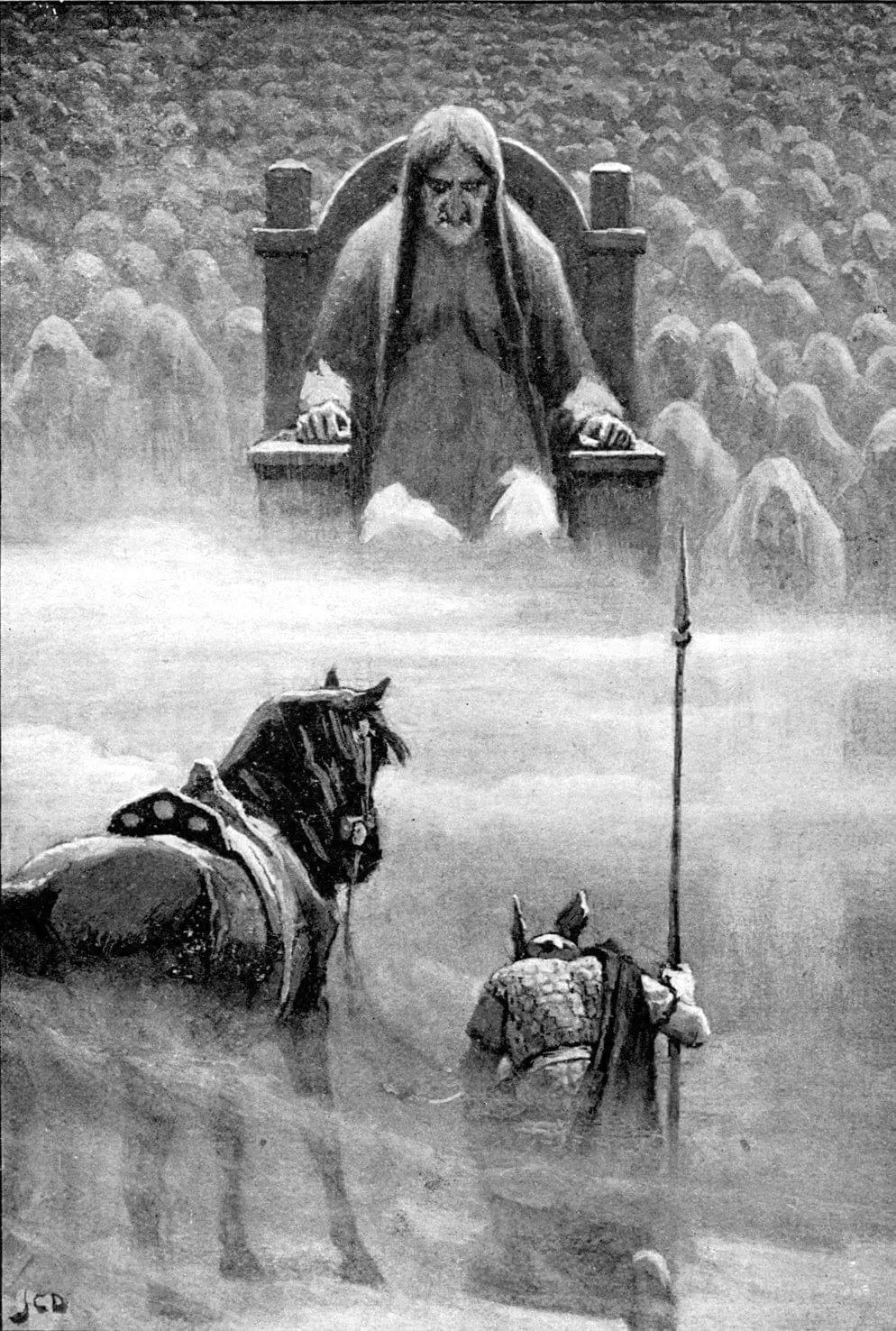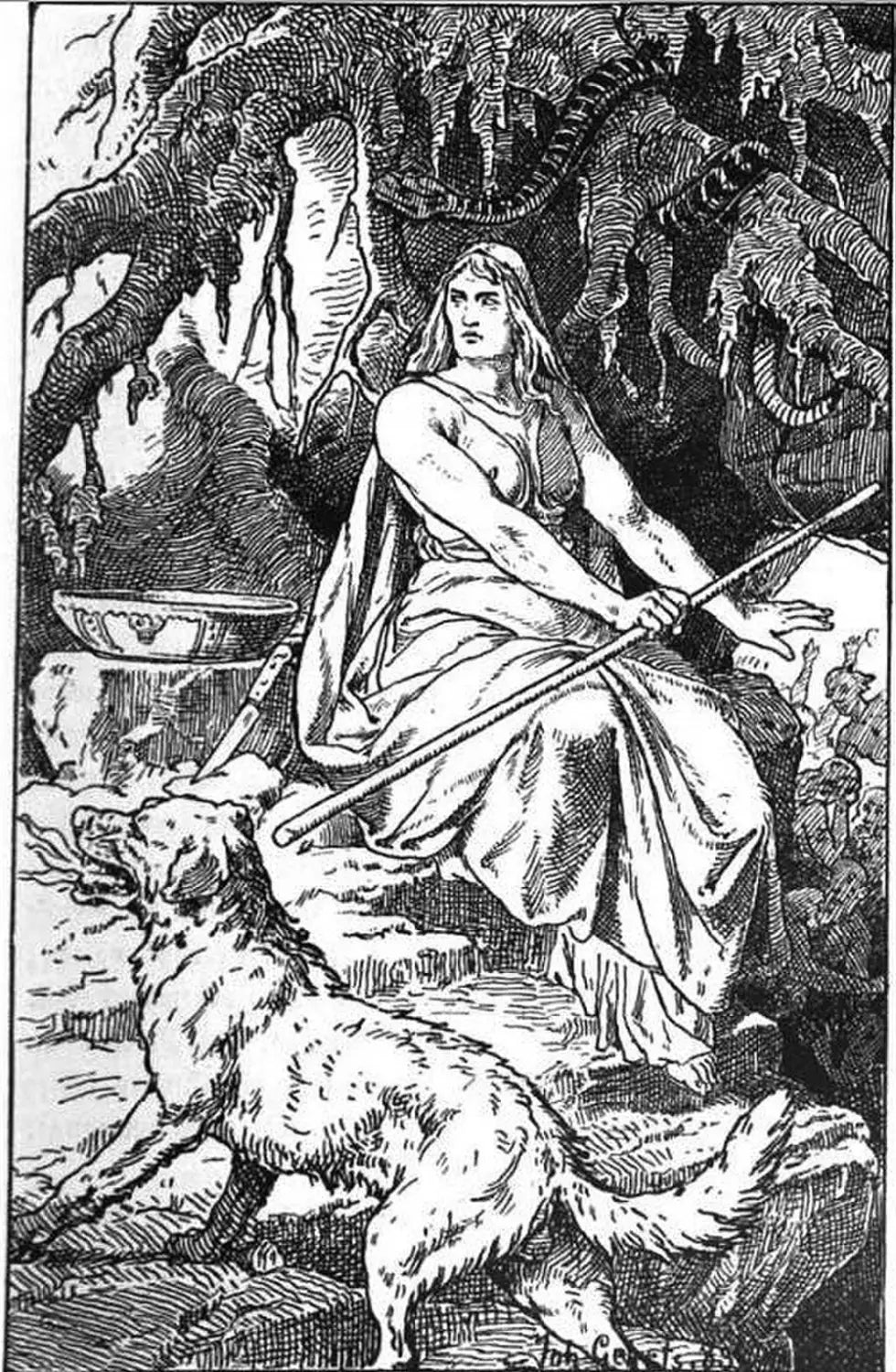Your Cart is Empty
Menu
-
- Shop by Type
- End of Line Sale Items
- New In
- Viking Gifts Under $40
- Hand Forged Axes
- Silver Viking Jewelry
- Stainless Steel Jewelry
- Cremation Jewelry
- Necklaces and Pendants
- Hand Carved Wooden Pendants
- Kings Chains
- Viking Drinking Horns
- Pendant Chains
- Rings
- Bracelets
- Earrings
- Beard Beads and Beard Rings
- Collectables
- Ceramic Mugs
- Street Wear
- Horn Jewelry
- Bronze and Pewter Jewelry
- Shop by Theme
- Viking Axe
- Celtic Jewelry
- Dragon or Serpent
- Viking Raven
- Wolf / Fenrir
- Rune Jewelry
- Odin Jewelry
- Ram / Goat
- Shieldmaidens / Lagertha
- Sword, Spear or Arrow
- Thor's Hammer / Mjolnir
- Tree of Life / Yggdrasil
- Helm of Awe / Aegishjalmur
- Triquetra or Triskelion
- Valknut / Knot of Slain
- Vegvisir / Viking Compass
- Veles / Bear
- Blogs
- Help
-
- Login

Hel

Hel is in Norse mythology the ruler of the underworld Helheim, a terrifying figure who is the daughter of Loki and the giantess Angerboda. Thus her siblings are the Midgard Serpent Jormungandr and the giant wolf Fenrir.
It is said of Hel that she is half blue-black and rotten like a corpse, and half flesh-coloured like a living human. Her name has also given rise to the word "hell".
In her early years, she was taken from her mother's halls by the gods to be cast down into Helheim, where she was given power over nine worlds so that she could show the dead their rightful place. Originally, all the dead probably came to Helheim in death, but after the belief in Valhal came, only those who died of illness or old age came to her. All who fell in battle went to Valhalla.
Everything in Hel's realm has sad or negative names. Her hall is called Eljudnir, which means "the rainy one". Her dish is called Hunger, and her knife is called Hunger. Her servant is called the Gangdoven and her servant is called Ganglad. Her threshold is called Falling Danger, her bed is called Run, which means "sickbed," and around the bed hangs the curtain "Broken Misfortune."
In the myth of Baldr we encounter Hel, who is not very keen on Baldr returning to the world of the living. But if he really is as beloved as they say, surely the whole world will weep for him too. And if the gods can make all the world weep for Baldr's death, Hel will let him return to the world of the living. The myth says that everything and everyone wept except Loki, who was disguised as an old giantess and thus Baldr had to remain in Helheim.

Residence
Her abode is called Helheim or Hel and the road leading to it is Helway, which is so long that Hermod had to travel it in nine days and nine nights, always northward and constantly descending. Helheim is surrounded by a wall in which one or more gates open and in its empire run shadowy rivers. One of these streams is called Slid. It rises in the east, flows westward through poison-infested valleys and is full of mud and swords. A dog, Garm, guards the entrance to one of its caverns, Gnipapellir.
The Access of Hel Helway is terrifying, for it chains the dying man with solid bonds that cannot be broken, while anguish gnaws at his heart and Hel's servants come every night to invite him in. Before the eyes of the dying man a dark and horrible region of mists unfolds; he sees the sun, the pure star of day, fade and disappear, and he hears the hinges of the Helheim Gate creak, and it opens to receive him. Hel's company is great, but she has an abode large enough for all; her empire stretches far away, her palaces are prodigiously high and have great gates. Naturally her abode is made of shadows, but it has the appearance of reality.
Dwellers
It was said that those who died on the battlefield went to Odin, to Valhalla, while those who died of sickness or old age went to Hel in Helheim. But others also seem to go, good or bad; for it is known that Baldr went to Hel when he was killed by Hodr. Siegfried, he who slew Fafnir, also when he was afterwards slain by Gunther, went to Hel; and Brunhilde likewise went there in her beautiful chariot after being burned on her funeral pyre. That is not all, for those virtuous in life who died naturally went also to heaven, but not to Valhalla, but to Vingólf, while those who lived in blasphemy and baseness though they died under arms went to one of the regions of Niflheim.
She cannot receive those drowned in the sea since they belong to the goddess Ran, therefore she only gets the dead on dry land. Noblewomen also did not go to Hel, as they were taken in by Freya after their death, while maidens dwelt with Gefjun.

Hel and Baldr
Before Baldr died, Odin went down to Helheim to ask Hel how Baldr would die. The first to come was Hel's hellhound, who with a bloody chest barked at Odin for a long time, until he disguised himself and met the mistress of hell, who told him that Baldr would die at the hands of Hodr.
When Baldr's death was consummated, Hermod, the swiftest of all the gods, mounted Sleipnir, Odin's horse, and rode to Helheim. When he arrived he saw his brother occupying the most distinguished seat in the palace.
Hermod, explaining to Hel the sorrow of the gods and all living things for the death of Baldr, asked her to let him return to Asgard. The latter asked that all things in the world, animate and inanimate, mourn Baldr's death to see if he was so beloved; only then would she bring him back to life.
So everything in the world mourned for their dead god; all except a giantess named Thokk. This one, who in reality was Loki in disguise, refused to cry since she said that Baldr had never given her any joy. Thus Baldr will remain in Helheim until Ragnarök.

